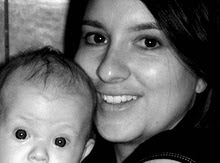I clean the kitchen counter and the piles move to the desk upstairs. I get the laundry room emptied of clean laundry and the pile plops down in my bedroom. I straighten up the living room by tossing all toys down the playroom steps.
This is a constant, nagging source of guilt. I admit that there is this pressure to have a neat house. Especially since I'm home all day and 'not doing anything else'. But really people, when everyone who lives in a house are not in it for 8-10 hours out of every day, that's 8-10 hours less of mess-making time. And my house wasn't perfectly neat when I did leave it for a chunk of each day. It's definitely worse now. I'd like to blame it on the rug rats, but Medman and I do our share. We are especially good at our own particular pockets of messiness. Medman keeps his in the basement (the Med Cave) or hidden on his side of the bed. Mine are my night stand, my entire craft room and unfortunately in everyone's way on the kitchen counter.
BUT, my friend Karen posted a link to the most wonderful article called "Saying Yes to the Mess." Here are some of my favorite quotes:
It is a truism of American life that we’re too darn messy, or we think we are, and we feel really bad about it....But contrarian voices can be heard in the wilderness. An anti-anticlutter movement is afoot, one that says yes to mess and urges you to embrace your disorder. Studies are piling up that show that messy desks are the vivid signatures of people with creative, limber minds (who reap higher salaries than those with neat “office landscapes”) and that messy closet owners are probably better parents and nicer and cooler than their tidier counterparts. It’s a movement that confirms what you have known, deep down, all along: really neat people are not avatars of the good life; they are humorless and inflexible prigs, and have way too much time on their hands.
(sorry you neat people, but I have suspected this for awhile...)
"It’s chasing an illusion to think that any organization — be it a family unit or a corporation — can be completely rid of disorder on any consistent basis,” said Jerrold Pollak, a neuropsychologist at Seacoast Mental Health Center in Portsmouth, N.H., whose work involves helping people tolerate the inherent disorder in their lives. “And if it could, should it be? Total organization is a futile attempt to deny and control the unpredictability of life."
It was the overall scumminess of Alexander Fleming’s laboratory that led to his discovery of penicillin, from a moldy bloom in a petri dish he had forgotten on his desk.
"Stop feeling bad," say the mess apologists. "There are more urgent things to worry about."
It’s a flippant remark, but if you’ve never had a messy kitchen, you’ve probably never had a home-cooked meal.
Mess is robust and adaptable, like Mr. Schwarzenegger’s open calendar, as opposed to brittle, like a parent’s rigid schedule that doesn’t allow for a small child’s wool-gathering or balkiness.
Mess tells a story: you can learn a lot about people from their detritus, whereas neat — well, neat is a closed book. Neat has no narrative and no personality.
[Studies] linked messy desks to higher salaries (and neat ones to salaries under $35,000), answer Einstein’s oft-quoted remark, “If a cluttered desk is a sign of a cluttered mind, of what, then, is an empty desk?”
So there you go, everyone. Don't waste your Saturday cleaning. Relish your messes! And think, that mess makes you more interesting, more real and it should raise your salary.







No comments:
Post a Comment
Leave me a comment. It will make me happy. Very, very happy.